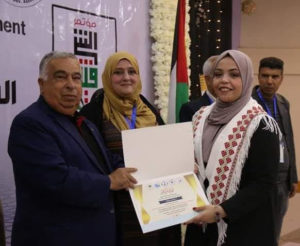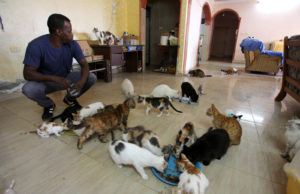Area economist says hardship, destitution ‘generate great and creative minds’
Hind Abunijela, a journalism student, poet, political researcher and social activist with an extra dose of energy, started an initiative in November called “Keswa” − an Arabic term that means clothing − by collecting clothes in good condition and then distributing them to the poor.
Almost 40 Gazan families, with an average of two packages per family, have benefited so far, Abunijela told The Media Line, adding that social media has played a major role in spreading awareness of the initiative, meaning many more families can eventually benefit.
“I use different kinds of social media platforms to garner as much support as possible, and I have more than 13,000 followers,” she said.
“It is very useful indeed,” she continued. “I receive many calls and direct messages every day from both donors and destitute people who learn about my initiative via Facebook and Instagram, which makes it easier for me to reach both groups.”

Hind Abunijela (right) receives a commendation for her work. (Sanaa Alswerky)
This is not Abunijela’s first effort to help people.
“I started voluntary and social activities eight years ago and managed to establish psychological support sessions and various social initiatives with various target groups,” she explained. “But I try to focus on the most vulnerable categories in Gaza, such as the elderly, cancer patients, young students, girls and the neediest families.”
Some 33.8% of Gaza’s residents live in extreme poverty, and 70% lack food security, the Palestinian Authority’s Social Development Ministry said in October.
Abunijela believes government and civic institutions, as well as the international community, share responsibility for the humanitarian collapse in Gaza.
“They failed in discharging their functions either by neglecting serious problems or by permitting sustained corruption and patronage, which in turn destroyed and wasted the productive potential of youth, breeding despair and frustration that often manifest themselves in random violence and suicide,” she said.
She expressed disappointment that hardworking young people like herself have not been given a chance to succeed and are stuck in dead-end situations.
“I personally don’t have a regular job yet,” she continued. “My two brothers have emigrated to Germany. I’d be lying if I said I’m not waiting for any chance to leave, too.”
Fahmi Shurrab, a writer and community activist, has implemented multiple initiatives to help people burdened by debts they cannot pay. He believes that the Israeli blockade, together with internal social divisions, has devastated the economic and social situation in the coastal enclave.
“If there were no blockade or divisions, maybe the [debt-repayment] initiative would be stronger or maybe there would be no need for it at all,” he told The Media Line.
Recently, Shurrab concluded a campaign, started in October, that was aimed at paying poor families’ debts to pharmacies by raising money from local and foreign donors. The debts of more than 1,200 families to 120 different pharmacies throughout the Gaza Strip were paid at an average of about $200 per family, he told The Media Line, adding that it helped both sides.
“Out of 1,050 pharmacies throughout the strip, 100 have been shut down due to bankruptcy, and the owners have emigrated to other countries in search of a livelihood,” he said.
Shurrab opines that the difficult living conditions, lack of opportunities and absence of hope are some of the main causes for people leaving the country.
“Breeding hungry, ignorant and angry minds in any geographical region is in no one’s interest,” he said. “In such a situation, criminality and terrorism are inevitable. Even the US would be impacted [by such conditions].”
Samir Abumdallalah, a professor of political science at Gaza’s Al-Azhar University, told The Media Line that 13 years of the blockade and two years of Trump Administration sanctions and other measures against the Gaza Strip have profoundly damaged the area’s economic structure.
“Youth unemployment rates have skyrocketed to 70%, and the private sector, which is the largest contributor to the Palestinian gross domestic product, has witnessed a dramatic deterioration during the last couple of years, leading to potentially volatile situations,” he said.
Abumdallalah thinks that the hardships and destitution of Gaza have somehow generated “great and creative minds” that work hard to serve their community and escape a bitter reality through independent work.
“They are all moves in the right direction,” Abumdallalah said of the initiatives.
Despite limited resources and a scarcity of funds in the Gaza Strip, the charitable initiatives are not confined to the benefit of humans.
Sa’eed Alerr is a dog trainer and animal rights activist who founded Sulala (For Animals’ Care). With the help of volunteers, he runs an initiative that cares for stray animals and then puts them up for adoption, helping hundreds of cats and dogs so far.
Whenever he can, Alerr makes field trips to feed stray animals in different areas of the Gaza Strip, and brings sick or injured creatures to his home to receive treatment.

Sa’eed Alerr feeds the many cats he keeps in his home as a temporary measure. (Sanaa Alswerky)
“I currently have more than 35 cats in my house,” he said.
Alerr told The Media Line that animals in the enclave live under difficult circumstances.
“Wars and continuous [military] escalations frighten the animals, and in many cases kill them,” he said. “Furthermore, the difficult economic situation forces people to classify animals as a secondary priority, and the lack of animal-rights awareness in Palestinian society has exacerbated the crisis.”
Alerr is well on his way to achieving his dream of establishing an animal shelter.
“After many tries, I have managed to sign a cooperation agreement with the Gaza City Municipality under which a piece of land will be allocated to the shelter,” he said. “Construction is expected to get underway in a couple of months.”